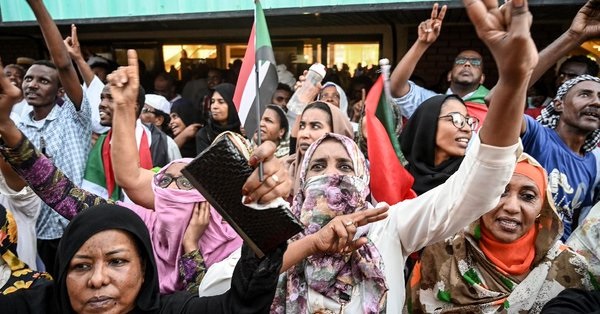
Cairo, Egypt | AFP | Sudan is at risk of getting bloodier with more violence and chaos gripping the country, analysts said on Tuesday, after more than 35 people were killed in a protest crackdown.
The Alliance for Freedom and Change that spearheaded protests which ousted Omar al-Bashir on April 11 had called for fresh rallies demanding civilian rule after Monday’s violent dispersal.
Hassan Saouri, a political science professor at Neelain University in Khartoum, said the violence could spark more political uncertainty.
The northeast African nation could be headed “towards all kinds of chaos — politically, militarily and societally,” he told AFP from Khartoum.
“The chaotic scene could see younger military officers either joining the ranks of the revolution or backing the military council,” he added.
– Why the violent escalation? –
A day after more than 35 demonstrators were killed in what civil society groups have called a “bloody massacre”, Sudan’s military council leader Abdel Fattah al-Burhan cancelled an expected power-transfer agreement.
“The Alliance for Freedom and Change has adopted a hardline position in their negotiations with the military council. It hasn’t even recognised the TMC’s role in fomenting the revolution,” said Saouri.
The military crackdown came after the protest movement called a strike that brought the country to a standstill last week.
“The general strike was initially very successful and was about to paralyse the capital completely. That is why the military rulers thought to snatch one of their trump cards by neutralising the sit-in.”
Saouri said the relations between the protest movement and military rulers had completely broken down.
“There is a lack of trust between the military forces and the protesters. There is no common vision in running the country,” he said.
– Will elections be free and fair? –
Burhan called for elections within nine months after the weeks-long sit-in outside the army headquarters in Khartoum was forcefully broken up.
But analysts are sceptical of the timing amid a backdrop of the intensified crackdown.
“It is hard to imagine that the elections will be free and fair at this stage as civil society in Sudan is unable to develop under the current pressure of the military,” said Andreas Krieg, assistant professor at King’s College in London who researches civil and military relations in the Arab world.
“The elections will not offer a representative and pluralistic choice for voters,” he told AFP.
Saouri said the demonstrators were “not ready” politically.
“Elections are a tactic by the TMC to force the protesters to give up some of their demands,” he told AFP from Khartoum.
So far, the protesters have rejected the military’s call for an early election and vowed to continue their fight for civilian rule.
– Who is supporting the military? –
Sudan’s powerful military rulers have been shoring up regional support from Egypt, Saudi Arabia and the United Arab Emirates.
Burhan and his deputy Mohamed Hamdan Dagalo, head of the Rapid Support Forces, went on a regional tour last week ahead of the sit-in dispersal.
During Burhan’s visit to the Gulf, he was encouraged to show “determination” in order to avoid a repeat of the “dire situations in Libya and Yemen”, said Mathieu Guidere, a politics professor at the University of Paris 8.
Dagalo, known as Himediti, has deployed his paramilitary troops to Yemen where they have been fighting as part of a Saudi-led coalition.
The general met in Jeddah last week with Saudi Crown Prince Mohammed bin Salman, who heaped praise on him for his management of the grinding crisis in Sudan.
Since Bashir’s ouster, Saudi Arabia and the United Arab Emirates have pledged three billion dollars (2.7 billion euros) in financial assistance to Sudan’s new military rulers.
“The crackdown in Sudan is most probably supported by regional powers keen on maintaining the authoritarian status quo and who systematically try to prop up the old regimes and their strong armies,” Karim Bitar, an expert at the Institute for International and Strategic Affairs, told AFP.
Both Gulf power-brokers along with Cairo have thrown their weight behind the Sudanese military for fear of a repeat of the turbulence that followed the Arab Spring in several countries in 2011.
 The Independent Uganda: You get the Truth we Pay the Price
The Independent Uganda: You get the Truth we Pay the Price



